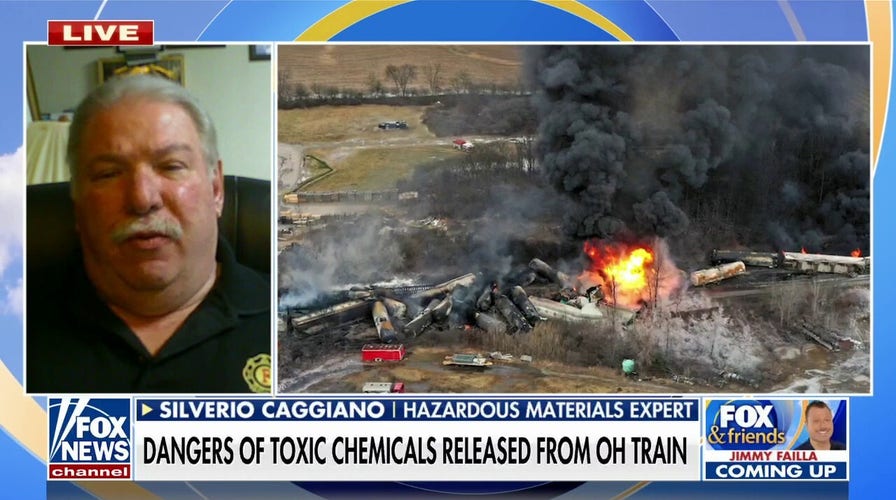Ohio Train Disaster: Long-Term Impact Of Toxic Chemical Exposure In Buildings

Table of Contents
Assessing the Extent of Contamination
The train carried a multitude of hazardous materials, with vinyl chloride being the most prominent chemical released. Vinyl chloride, a known carcinogen, is a volatile organic compound (VOC) that readily disperses into the air. Other chemicals released, including butyl acrylate and ethylhexyl acrylate, also pose significant health risks. These chemicals can readily penetrate porous building materials such as drywall, wood, and insulation, settling into carpets, fabrics, and HVAC systems.
Assessing the true extent of the contamination presents formidable challenges:
- Sampling and Testing Difficulties: Obtaining representative samples from diverse building materials is complex and requires specialized expertise.
- Lack of Standardized Protocols: Currently, there's no universally accepted protocol for assessing chemical contamination levels in buildings following an incident like this. This makes comparing data and assessing the overall impact challenging.
- Long-Term, Low-Level Exposure: The concern isn't just about immediate high-level exposure but also the possibility of long-term, low-level exposure to residual chemicals within buildings. This insidious threat makes detection and mitigation even more crucial.
Ongoing investigations and studies are attempting to quantify the extent of contamination, but the full picture remains unclear and requires significant further research into the long term effects of toxic chemical exposure in buildings.
Health Risks Associated with Long-Term Exposure
Vinyl chloride is linked to a range of serious health problems, including:
- Respiratory Issues: Exposure can trigger asthma, bronchitis, and other respiratory illnesses, particularly impacting vulnerable populations like children and the elderly.
- Liver Damage: Vinyl chloride is a hepatotoxin, capable of causing liver damage and even liver cancer.
- Increased Cancer Risk: The most serious risk is the increased likelihood of developing various cancers, including liver cancer, brain cancer, and lung cancer.
- Neurological Effects: Some studies suggest links between vinyl chloride exposure and neurological problems.
Prolonged exposure, even at low levels, increases the severity and likelihood of these health problems. The long-term health monitoring of the affected population is crucial to understanding the full impact of the Ohio train disaster long-term impact on public health. Further research into the long-term effects of these chemicals is vital.
Remediation and Decontamination Challenges
Cleaning and remediating contaminated buildings is a complex and costly undertaking. Methods may include:
- Air Scrubbing: Using specialized equipment to remove airborne contaminants.
- Surface Cleaning: Thorough cleaning of surfaces using appropriate decontamination solutions.
- Material Removal: In severe cases, complete removal and disposal of heavily contaminated building materials may be necessary.
However, significant challenges remain:
- High Costs: Remediation can be exceptionally expensive, placing a significant burden on homeowners and potentially hindering complete decontamination efforts.
- Time-Consuming Process: Effective decontamination takes considerable time, requiring careful planning and execution.
- Incomplete Removal: It's difficult to guarantee the complete removal of all traces of chemicals from building materials.
- Expertise Limitations: Specialized expertise in handling these particular chemicals is limited, adding another layer of complexity.
Legal and Regulatory Implications
The legal responsibilities of Norfolk Southern, government agencies, and other involved parties are currently under intense scrutiny. Lawsuits are likely to follow, focusing on compensation for property damage, medical expenses, and other losses stemming from the Ohio train disaster long-term impact. Existing regulations and environmental protection laws will be rigorously examined in light of this disaster. The incident highlights the urgent need for improved safety regulations, stricter enforcement, and better-prepared emergency response protocols for handling hazardous material transportation accidents.
Long-term Monitoring and Research
Continuous monitoring of air and water quality in the affected region is essential to track the dispersal and persistence of contaminants. Equally crucial are comprehensive, long-term health studies to fully assess the impact of the disaster on the exposed population. Further research needs to focus on developing more effective remediation strategies and improving long-term health management for individuals affected by toxic chemical exposure in buildings.
Understanding the Lasting Impact of the Ohio Train Disaster
The Ohio train derailment underscores the devastating and long-lasting consequences of hazardous material spills. The Ohio train disaster long-term impact extends far beyond the immediate aftermath, posing significant health and environmental risks. Comprehensive remediation efforts, continuous health monitoring, and the implementation of enhanced safety regulations are vital to mitigating the long-term consequences. We must learn from this tragedy and advocate for stronger environmental regulations to prevent future disasters. Stay informed about the ongoing developments, support organizations assisting affected communities, and demand better protection from the dangers of hazardous materials transportation. Let’s ensure this disaster leads to meaningful change and fosters more robust research into the long term effects of toxic chemical exposure in buildings.

Featured Posts
-
 Mtv Cribs A Glimpse Into The World Of Extravagant Real Estate
May 11, 2025
Mtv Cribs A Glimpse Into The World Of Extravagant Real Estate
May 11, 2025 -
 Serious Health Issues Force Phil Collins To Give Concerning Update
May 11, 2025
Serious Health Issues Force Phil Collins To Give Concerning Update
May 11, 2025 -
 Untapped Talent Alex Winters Lesser Known Mtv Sketch Comedy Series
May 11, 2025
Untapped Talent Alex Winters Lesser Known Mtv Sketch Comedy Series
May 11, 2025 -
 Conclave 2024 Nine Possible Successors To Pope Francis
May 11, 2025
Conclave 2024 Nine Possible Successors To Pope Francis
May 11, 2025 -
 Adam Sandlers Net Worth How Comedy Pays Big
May 11, 2025
Adam Sandlers Net Worth How Comedy Pays Big
May 11, 2025
